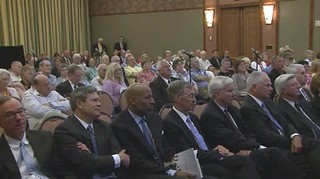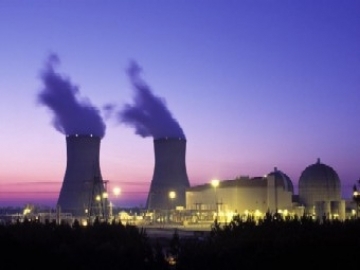All
thermal power generation requires water for cooling,
with nukes so vulnerable no private insurer will cover them anyway
and failing frequently in recent heat waves.
“Natural” gas is no better than coal or oil for water use;
maybe worse because all those pipelines vulnerable to backhoes
or corrosion or attack.
Even hydro is vulnerable to lack of rainfall.
Carbon sequestration doesn’t get good marks, while
conservation and efficiency get rave reviews from
a study of insurance perspectives on power generation.
What’s the one power source this article about insurance risks does not say
is fragile in the face of climate change?
Hint: look up.
Limiting Liability in the Greenhouse:
Insurance Risk-Management
Strategies in the Context of
Global Climate Change,
by
Christina Ross, Evan Mills, and Sean B. Hecht,
Stanford Environmental Law Journal and the Stanford Journal of International Law,
Symposium: on Climate Change Risk, Vol. 26A/43A:251, 2007.
 Supply-side energy choices that may be made to reduce the
carbon-intensity of energy services have their own distinctive
liability characteristics. For example, switching to lower-carbon
electricity generation technology based on thermal power plant
technology (e.g., by substituting natural gas for coal) results in
systems that are still heavily dependent on water resources for
cooling. The Electric Power Research Institute has documented
considerable risks to traditionally cooled power generation systems
as a result of climate
change-induced droughts.242 Similarly, “zero-emissions” hydroelectric
generating systems are also sensitive to rainfall patterns.
Supply-side energy choices that may be made to reduce the
carbon-intensity of energy services have their own distinctive
liability characteristics. For example, switching to lower-carbon
electricity generation technology based on thermal power plant
technology (e.g., by substituting natural gas for coal) results in
systems that are still heavily dependent on water resources for
cooling. The Electric Power Research Institute has documented
considerable risks to traditionally cooled power generation systems
as a result of climate
change-induced droughts.242 Similarly, “zero-emissions” hydroelectric
generating systems are also sensitive to rainfall patterns.
242
Denis Albrecht,
Electric Power Research Institute, Presentation:
Climate Impact on Water Availability for Electricity Generation
(April 11, 2006) (presentation slides associated with the Electric
Power Research Institute).
Centralization considered harmful
Continue reading →
 The same Energy Policy Act of 2005 that
subsidized dirty oil and fracked methane including LNG exports
also funded
that oxymoron “clean” coal such as Southern Company’s Plant Ratcliffe
in Mississippi,
ethanol production lining the pockets of Monsanto, and
the $8.3 billion loan guarantee
to Georgia Power for the new nukes at Plant Vogtle.
The same Energy Policy Act of 2005 that
subsidized dirty oil and fracked methane including LNG exports
also funded
that oxymoron “clean” coal such as Southern Company’s Plant Ratcliffe
in Mississippi,
ethanol production lining the pockets of Monsanto, and
the $8.3 billion loan guarantee
to Georgia Power for the new nukes at Plant Vogtle.
 2005 was a very long time ago in solar PV years:
prices are halved, and installed solar power production is up more
than ten times and growing exponentially like compound interest.
We need to stop throwing money at dirty, water-sucking,
centralized baseload 20th century non-solutions and get on with
clean 21st century distributed solar and wind power
for jobs, for energy independence, and for clean air and water,
not to mention less climate change.
2005 was a very long time ago in solar PV years:
prices are halved, and installed solar power production is up more
than ten times and growing exponentially like compound interest.
We need to stop throwing money at dirty, water-sucking,
centralized baseload 20th century non-solutions and get on with
clean 21st century distributed solar and wind power
for jobs, for energy independence, and for clean air and water,
not to mention less climate change.









